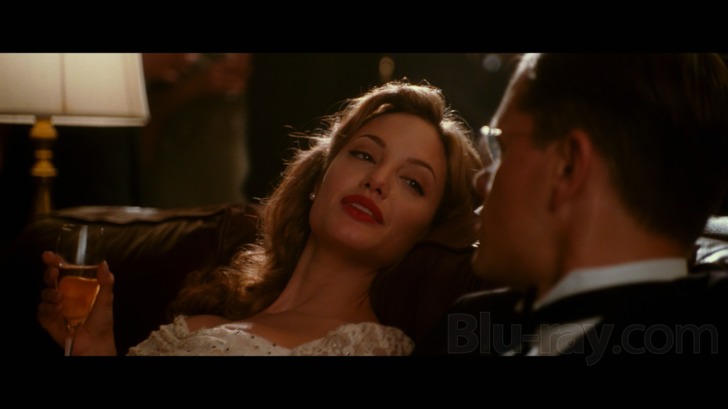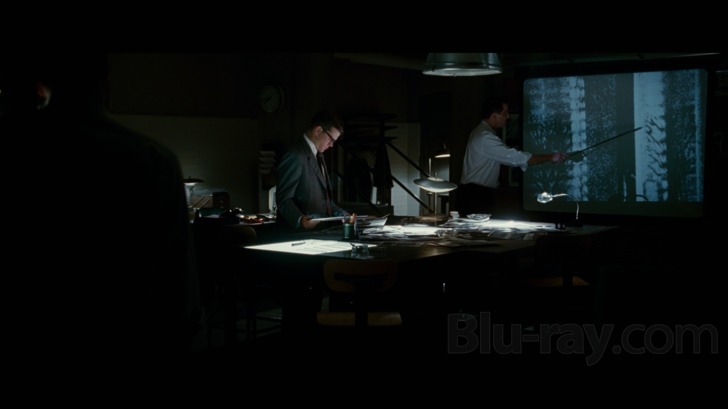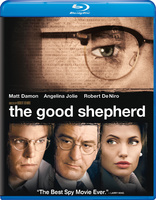The Good Shepherd Blu-ray Movie
HomeThe Good Shepherd Blu-ray Movie 
Universal Studios | 2006 | 167 min | Rated R | Jan 06, 2015Movie rating
6.5 | / 10 |
Blu-ray rating
| Users | 4.2 | |
| Reviewer | 3.5 | |
| Overall | 3.5 |
Overview
The Good Shepherd (2006)
The tumultuous early history of the Central Intelligence Agency is viewed through the prism of one man's life.
Starring: Matt Damon, Angelina Jolie, Alec Baldwin, Tammy Blanchard, Robert De NiroDirector: Robert De Niro
| Drama | 100% |
| History | 63% |
| Thriller | Insignificant |
Specifications
Video
Video codec: MPEG-4 AVC
Video resolution: 1080p
Aspect ratio: 2.40:1
Original aspect ratio: 2.39:1
Audio
English: DTS-HD Master Audio 5.1 (48kHz, 24-bit)
French: DTS 5.1
Subtitles
English SDH
Discs
50GB Blu-ray Disc
Single disc (1 BD)
Playback
Region free
Review
Rating summary
| Movie | 3.5 | |
| Video | 4.5 | |
| Audio | 4.0 | |
| Extras | 1.5 | |
| Overall | 3.5 |
The Good Shepherd Blu-ray Movie Review
Try Not to Eat Lamb
Reviewed by Michael Reuben January 9, 2015The Good Shepherd, Robert De Niro's directorial passion project, may not be reliable as a history of the early CIA—can we ever have one, given the quantity of still-classified documents and critical information that was never recorded?—but the film remains an effective morality tale about the corrosive effects of power and the loss of one man's soul. Oscar-winning screenwriter Eric Roth (Forrest Gump) began the script as a project for Francis Ford Coppola, whose American Zoetrope remained involved to the end, and it's not hard to see many similarities between Coppola's Godfather saga and the finished product. Both depict the humble beginnings of what was initially supposed to be a small organization deemed necessary to combat a much larger and more dangerous enemy. Both show how the organization expanded far beyond its original goals (though De Niro's film, which ends in 1961, can only hint at some of the excesses that resulted in the controversial intelligence reforms of the mid-Seventies). And both trace the progression of a young idealist who matures into a hardened pragmatist, eventually betraying every principle in which he ever believed. Roth drew on many sources for his screenplay, but his original inspiration was the novel by Norman Mailer, Harlot's Ghost. Although many characters borrowed traits and job descriptions from real-life counterparts, the story went through numerous revisions and inventions as the project moved from one studio to another, with different stars and directors attached. When the film ultimately landed at Universal with De Niro as director, the studio could not resist promoting the film as the "untold story" of the CIA, but nowhere does the film claim to be based on true events, because the fictionalization is thorough. (The credits end with the standard disclaimer denying any similarity to actual persons or events, although it does concede that the film was "inspired" by a "true story".) What The Good Shepherd captures so effectively, however, is the chilly Cold War paranoia that also coursed through the recent remake of Tinker Tailor Soldier Spy. Like that espionage thriller, De Niro's film relies on slow buildup and quiet menace rather than quick cuts and gun play. The world of The Good Shepherd is one in which a perfectly ordinary man can wake up, put on his suit, tie and hat, and take the bus to work along with dozens who look just like him. Then he sits at his desk and orders one death or dozens without batting an eye. When Michael Corleone compared his father to a president or a senator, his bride-to-be protested that "presidents and senators don't have men killed", but of course they do. The Good Shepherd is the story of a man who handles such matters, as quietly as possible.

The film's central figure is Edward Wilson (Matt Damon), who, in 1961, oversees the disastrous Bay of Pigs Invasion in which a CIA-sponsored Cuban paramilitary group tried and failed to overthrow Fidel Castro. For dramatic purposes, the failure is attributed to a leak within the CIA (the real causes are more complex), and Wilson must determine the source. His own job is at risk, and perhaps his life, since everyone in the small group that knew of the operation is suspected as a traitor. On the sly, Wilson seeks assistance from an old friend, FBI Special Agent Sam Murach (Alec Baldwin), who first recruited Wilson to work for the government many years ago. He also receives a mysterious package containing a grainy black-and-white photograph and a distorted audiotape, but no one knows what they mean or where they came from. Their analysis becomes the job of an efficient technical services officer (Christopher Evan Welch). In the style of The Godfather: Part 2, the film cuts back and forth between Wilson's investigation and the history that brought him to this point. As a student at Yale, he first meets Murach, when the G-man asks him to report on Nazi sympathizers among the faculty. Although his motives are mixed, Wilson plays the patriot and turns in his favorite professor (Michael Gambon), who is dismissed from the faculty. That history, plus Wilson's membership in the famous Skull and Bones society, make him part of the clique of military and political elite from which General Bill Sullivan (De Niro, in a small but pivotal role) recruits the Office of Strategic Services (or "OSS"), the military intelligence unit of World War II that would later become the CIA. Along the way, Wilson picks up a wife in the person of Margaret "Clover" Russell (Angelina Jolie), the sister of fellow "Bonesman", John Russell, Jr. (Gabriel Macht) and the daughter of a senator, John Russell, Sr. (Keir Dullea). It's a loveless marriage, but it produces a son, Edward, Jr. (Eddie Redmayne), who is perhaps the only person Wilson loves—"perhaps", because there is briefly a girl at Yale named Laura (Tammy Blanchard), whom Wilson must abandon for the senator's daughter. Very quickly, though, Wilson becomes accustomed to spending all his time in the company of spies. A week after his wedding, he leaves America for England; when he returns after six years, his wife and child barely know him. In England, he joins former classmate Richard Hayes (Lee Pace) and graduate Bonesman Philip Allen (William Hurt), and he is tutored in the techniques of espionage by members of the British secret service, including a young agent named Arch Cummings (Billy Crudup). He is also assigned a loyal staffer, Ray Brocco (John Turturro), who will remain his right-hand man for many years. Perhaps most importantly, when the war is over and the U.S. and Soviet Union are staking out their turf, Wilson travels to Berlin, where he acquires a determined KGB adversary, code-named "Ulysses" (Oleg Shtefanko). During their first face-to-face meeting, Ulysses genially informs Wilson that he is expected to be a formidable foe and that his code name within the Soviet service is "Mother". Ulysses looks forward to a long "association" (the term is deliberately ambiguous). As Wilson and Ulysess play out their rivalry over the years, De Niro and Roth try to use their battle to show how the CIA's original goal of being, in General Sullivan's phrase, "America's eyes and ears" but not its "heart and soul", becomes subverted by the tools of the spy trade. The constant trafficking in lies, subterfuge and disinformation causes the intelligence community to become "trapped in reflections", a phrase offered to Wilson as a caution by one of his early mentors. Soon enough, Wilson finds himself assisting in that mentor's permanent "retirement", and the incident troubles him, but such matters quickly become routine. Anything can be justified in the name of the greater good, even enlisting the aid of organized crime, as Wilson does when he consults mob boss Joseph Palmi (Joe Pesci) for assistance against Castro (an incident loosely based on historical fact). Asked by the Italian godfather for his equivalent of "family", Wilson responds, without irony: "The United States of America. The rest of you are just visiting." The line, especially in Damon's flat delivery, is a capsule summation of a fanatic. By this point in his career, he really does believe that he and his tight-knit group are the country. Whatever they decide to do must be the right thing, because they're the ones who decided it. Unfortunately, however, even at a nearly three-hour running time, De Niro and Roth simply don't have the scope to show the consequences of that philosophy on a global scale, which would require them to tackle several more decades of history. They're forced to rely too heavily on dialogue such as the Palmi/Wilson encounter. As effectively written, performed and shot as these scenes are, they are no substitute for a full dramatization. The Good Shepherd works better as a study of Wilson's moral decline, as his already-fragile marriage collapses and he struggles to connect with the son who is desperate to live up to the image of a remote and secretive father. It is within the tangle of Wilson's family relationships, including his inner connection to the memory of his long-dead father (played in flashback by Timothy Hutton), that the tragedy of Wilson's life and career registers with the full force that makes The Good Shepherd a moving and memorable experience.
The Good Shepherd Blu-ray Movie, Video Quality 

Three-time Oscar winning cinematographer Robert Richardson (JFK , The Aviator and Hugo) shot The Good Shepherd on film, with post-production on a digital intermediate. With the film's period-specific demands delegated primarily to the Oscar-nominated production design, Richardson's lighting can be roughly divided into two styles. One is a well-lit, cool, "man in a gray flannel suit" style designed to convey the ordinariness of Matt Damon's Wilson as he blends into his workaday surroundings. The other is a film-noir world of shadows, silhouettes, mirrors and pools of darkness, which represents the spy's natural element, filled with secrets and duplicity. Universal's 1080p, AVC-encoded Blu-ray is one of its better catalog efforts, probably because there was no need to retransfer The Good Shepherd from film elements, given the preparation of a DI and release via digital cinema. The image features plentiful detail, solid blacks, a rich and varied color palette and, best of all, none of the evidence of digital tampering that has marred so many Universal catalog releases. As is common with many DI-completed projects, the grain pattern is so fine as to be nearly undetectable, and some shots, when frozen in screencaps, may appear to have been sharpened (and, yes, DI colorists have been known to apply sharpening, with the DP's full approval). In motion, however, there are no edge halos and none of the video appearance that has been a recurrent feature of so many Universal catalog titles. The Good Shepherd looks exactly like a big-budget film shot in 2006 should look. A few sequences fade from black-and-white to color, and there appears to be some archival news footage that has been digitally enhanced (although, given Richardson's experience on JFK, it's entirely possible that some of the footage was convincingly recreated in camera). The transitions are handled so smoothly that they enhance the sense of realism. With only one extra, the bulk of the BD-50 has been devoted to the 167-minute film, yielding a healthy average bitrate of 30.13 Mbps, which is particularly helpful for some of the more complex crowd scenes and for Richardson's painterly layering of light and shadow.
The Good Shepherd Blu-ray Movie, Audio Quality 

Like its protagonist, the film's DTS-HD MA 5.1 soundtrack is a quietly emphatic affair, where small noises may suddenly register with great impact. An example occurs right at the opening, when the voices that Wilson will later hear on the tape anonymously delivered to his door are heard very loudly (but no more clearly than when Wilson first hears them). Throughout the film, the closing of a drawer, the turn of a safe dial, the striking of a match, or some other small sound may be amplified far louder than its natural place in the scene, either for emphasis or distraction. (One never knows.) Events like the various Skull and Bones dinners, or Wilson's ride to work on the street car, or the beach where he takes Laura for the day, receive sound mixes filled with subtle ambiance. Other occurrences are quick, noisy and unexpected, but they cannot be described without spoilers. The sound editing is expert in its realism; one execution occurs entirely off-camera, but every moment of it registers through sound. (It is an event of great significance to Wilson and his career.) The dialogue is clearly spoken and reproduced, which doesn't necessarily mean that it's "clear", since this is a film about people who make a point of concealing their meaning. The foreboding score is by Marcelo Zarvos (The Words) and Bruce Fowler (orchestrator of The Dark Knight Trilogy, among many other works)
The Good Shepherd Blu-ray Movie, Special Features and Extras 

The disc's sole extra is a group of seven deleted scenes (480i; 2.40:1, enhanced; 16:00), which are listed, and can be selected, separately or played as a group. The titles are listed below. Most of the scenes concern a deleted subplot involving Margaret Wilson's brother after the war:
- John Comes Home
- Edward & Sam at the Train Station
- Edward Confronts John
- Edward Asks Valentin to Play Violin
- John Enters Embassy, Edward & Clover Fight
- Ulysses Is Trying to Tell Us Something
- Edward & Ray Pack Office
The Good Shepherd Blu-ray Movie, Overall Score and Recommendation 

The Good Shepherd is only the second film directed by Robert De Niro (the first being A Bronx Tale), but on the strength of these two releases alone, De Niro is as much a force to be reckoned with behind the camera as in front. With studios' appetite for risk-taking at an all-time low, it requires someone of De Niro's caliber to attract such a roster of talent and thereby help secure a decent budget (and even then, many of the cast had to agree to pay cuts). Here's hoping he has a few more such "passion projects" on his agenda. Meanwhile, for everything it does right, The Good Shepherd is highly recommended.
Similar titles
Similar titles you might also like

Shadow Dancer
2012

Tinker Tailor Soldier Spy 4K
2011

Good Night, and Good Luck.
2005

The Kennedys
2011

Child 44
2014

Tinker Tailor Soldier Spy
1979

Smiley's People
1982

The Company
2007

J. Edgar
2011

The Spy Who Came in from the Cold
1965

Judgment at Nuremberg
1961

Reds
40th Anniversary Edition
1981

Battle for Incheon: Operation Chromite
Operation Chromite / In-cheon sang-ryuk jak-jeon
2016

The Manchurian Candidate 4K
1962

Invictus
2009

The Last Station
2009

Spies of Warsaw
2012

The Last King of Scotland
2006

The Last Emperor
1987

The Americans: The Complete First Season
2013
